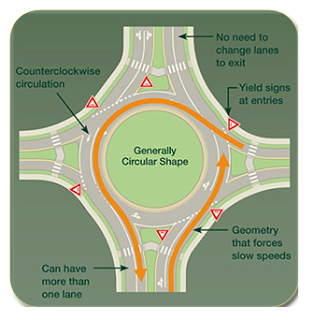
Traffic Circles and Roundabouts
December 1, 2011
Traffic circles and roundabouts are a type of road intersection that are gaining popularity throughout the nation. While not really a new idea, they seem to have become more prevalent over the past fifteen to twenty years as city planners and developers seek ways to keep traffic moving more smoothly and safely.
Traffic circles allow traffic to move more smoothly through an intersection without the use of traffic lights by use of a one way circle with “exits” to the intersecting roads. If you have never encountered one, they could be slightly intimidating at first but they are really quite simple and you will find they do keep traffic moving much more smoothly. They also keep the intersection safer by forcing traffic entering the circle to slow down and yield to traffic already in the circle. While traffic must slow to enter the circle, it doesn’t have to stop for red lights which can be especially frustrating when there is no traffic on the cross street.
Most traffic collisions in the US occur at intersections and the most common type of collisions are rear-end collisions. By slowing traffic on entering and keeping all traffic moving in the same direction, traffic circles cut down on the chances for collisions. With no traffic light, there is a zero chance of someone causing a collision by running a red light.
All traffic circles are designed basically the same way. The terms roundabout and traffic circles are often used interchangeably but traffic circles usually refer to larger, multi-lane circles. Traffic entering the circle must slow, wait for an opening in traffic and then enter to the right moving around the circle in a counterclockwise path. Once a driver reaches the “exit” to the road they want to enter, they exit the circle to the right.
If you live in a growing community, you may want to urge your city planners to consider more traffic circles to cut down on traffic congestion.
